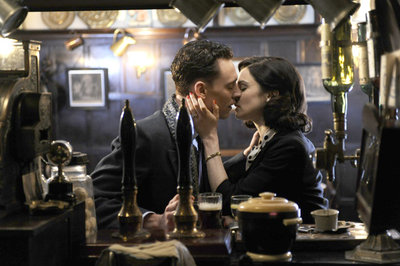Rachel Weisz is perfectly cast as the troubled heroine of gay filmmaker Terence Davies’ stylish adaptation of gay playwright Terence Rattigan’s period drama “The Deep Blue Sea,” which opens at the Ritz today. The Oscar-winning actor is so convincing as a woman in 1950s London, it’s hard to believe she’s a contemporary performer.
Weisz plays Hester, who attempts suicide (which is illegal) in the film’s opening moments. Davies uses a series of masterfully lit and composed vignettes, set to a swelling musical score to dramatize Hester’s decision to end her life.
This dazzling early sequence shows how Hester, though married to the wealthy William (Simon Russell Beale), met and fell in love with the poorer Freddie (Tom Hiddleston). The couple, however, has since grown more distant. Hester’s heartbreak is palpable. Alas, the rest of the film, while equally elegant, has a sense of diminishing returns rather than exponentially increasing power.
Saved from death, Hester must confront her situation. As the film unfolds, scenes show what prompted Hester’s (melo)dramatic actions. One key scene has Hester taking tea with William and his icy mother (Barbara Jefford). When she excuses herself to call her lover, Freddie, William discovers the betrayal. He refuses to grant her a divorce, and says he never wants to see Hester again.
The affair with Freddie quickly grows sour, even though the couple continues to live together. He returns home from a golf weekend and, feeling bad about missing Hester’s birthday, accidentally discovers her suicide note. Freddie’s anger and betrayal upon reading it — though Hester pleads with him not to — and their break-up form most of what audiences see of their relationship.
The film’s title comes from Hester’s line about being caught between the devil and the deep blue sea — the two lousy choices she has made — i.e., the men in her life. Hester maintains that she loves Freddie — she gave up a title for him — but that he does not love her. Yet audiences can only take her word for it. The film is as stifling as Hester is suffocated in her situation. When she is warned, “Beware of passion, it always leads to something ugly,” Hester questions how to act upon her romantic desires. “Guarded enthusiasm. It’s safer,” she is told.
Davies plays it safe too, mostly. Much of “The Deep Blue Sea” is so acutely measured — from the stagey sets, to the long dialogue pauses fraught with meaning — that these fine moments feel artificial: They lack the impact they might otherwise have. A long tracking shot in a subway tunnel during the blitz is a virtuoso sequence, but the meaning of this event from Hester’s past is minimal given the way Davies jumps the narrative back and forth through time.
A better example of effectively downplaying the drama occurs in a scene in which the landlady at Freddie and Hester’s boarding house learns that the couple is unmarried. She neither condemns nor condones the situation, indicating that what people do in private is their business. Still, the scene has a keen sense of judgment about it. The film could have used more sharp moments like this.
When Davies captures the unbearable aspects of Hester’s life, he creates uncomfortable situations that sting all of the characters. A fight between Freddie and Hester in a museum, for example, plays more on the characters’ class differences than what is really being discussed. Another argument, outside a pub, also has potency, in part because Hester seeks Freddie out in the pub first, only to encounter the patrons singing at full volume, drowning out their exchange.
Despite its flaws, the film is incredibly beautiful. The characters’ costumes and hairstyles are spot-on, down to every last detail — from the landlady’s headscarf to William’s mother’s brooch. The cinematography is also superb. One of the most exquisite shots in “The Deep Blue Sea” is an oft-used image of Hester’s profile reflected back in a mirror as she looks out a window.
Likewise, Davies uses music appropriately throughout as is his signature as a filmmaker. A scene of the characters singing “You Belong to Me” in a pub captures Freddie and Hester’s enthusiasm but is also full of irony.
For all the wonderful touches, however, “The Deep Blue Sea” fails to yield enough emotion to be fully satisfying. Although Weisz gives a magnificent performance, Hiddleston and Beale seem more like cardboard cutouts than real flesh-and-blood characters. Maybe it’s British stiffness, but as Hiddleston cries out in anger and Weisz just cries, viewers may be bored to tears.

